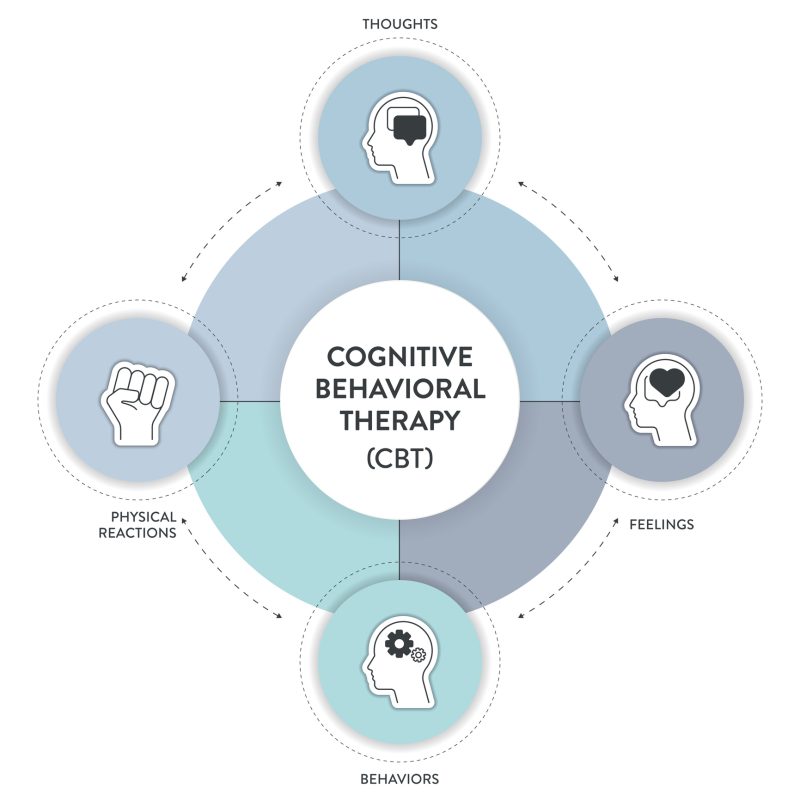Cognitive Behavioural Therapy (CBT)

Cognitive Behavioral Therapy (CBT) diagram chart infographic banner with icon vector has thoughts, feelings, behaviors and physical reactions. Transformative Mental health and well-being concepts.Info
Cognitive behavioural therapy or CBT is one of the most widely used therapy techniques for a wide range of mental health issues. Today, cognitive behaviour therapy is one of the most well-studied forms of treatment.
Cognitive behavioural therapy is a method of psychological treatment that uncovers the relationship between thoughts, feelings, and behaviour to help people improve their lives. It is based on the principle that mental health issues are a result of unhealthy thinking patterns that lead to unhealthy coping mechanisms. By addressing these thought processes, a person can feel better.
Cognitive behavioural therapy focuses on changing the automatic negative thoughts that can contribute to and worsen our emotional difficulties, depression, and anxiety. These spontaneous negative thoughts also have a detrimental influence on our mood.
CBT Typically Includes These Steps:
- Identify troubling situations or conditions in your life. These may include such issues as a medical condition, divorce, grief, anger or symptoms of a mental health disorder. You and your therapist may spend some time deciding what problems and goals you want to focus on.
- Become aware of your thoughts, emotions and beliefs about these problems. Once you’ve identified the problems to work on, your therapist will encourage you to share your thoughts about them. This may include observing what you tell yourself about an experience (self-talk), your interpretation of the meaning of a situation, and your beliefs about yourself, other people and events. Your therapist may suggest that you keep a journal of your thoughts.
- Identify negative or inaccurate thinking. To help you recognise patterns of thinking and behaviour that may be contributing to your problem, your therapist may ask you to pay attention to your physical, emotional and behavioural responses in different situations.
- Reshape negative or inaccurate thinking. Your therapist will likely encourage you to ask yourself whether your view of a situation is based on fact or on an inaccurate perception of what’s going on. This step can be difficult. You may have long-standing ways of thinking about your life and yourself. With practice, helpful thinking and behaviour patterns will become a habit and won’t take as much effort.
Mental Health Disorders That May Improve with CBT Include:
- Depression
- Anxiety and panic attacks
- Anger issues
- Stress
- PTSD
- Sleep issues/insomnia
- Body dysmorphic disorder/Poor body image
- Grief and loss
- Eating disorders
- Obsessive-compulsive disorder (OCD)
- Drug and alcohol problems
- Bipolar disorders
- Schizophrenia
- Sexual disorders
What You Can Expect
If CBT is recommended, you’ll usually have a session with a therapist once a week or once every 2 weeks.
At your first sessions, your therapist will typically gather information about you and ask what concerns you’d like to work on. The therapist will likely ask you about your current and past physical and emotional health to gain a deeper understanding of your situation.
Your therapist will encourage you to talk about your thoughts and feelings and what’s troubling you.
CBT generally focuses on specific problems, using a goal-oriented approach. As you go through the therapy process, your therapist may ask you to do homework — activities, reading or practices that build on what you learn during your regular therapy sessions — and encourage you to apply what you’re learning in your daily life.
Online Psychologists & Therapists Australia | Adelaide Psychology Clinic
We are at Sehat Psychology, Beck Institute CBT Certified Clinicians that demonstrate our expertise in the most evidence-based psychotherapy treatment for body dysmorphia. You can contact us on (08) 7079 9529 or email admin@sehatpsychology.com.au to book an appointment (telehealth or face to face) with our CBT therapist.
Adelaide Psychologists & Therapists | CBT Psychologists & Therapists
There are many types of therapy that could help you on your journey towards better mental and emotional health. CBT is one of the most innovative and, in our experience, most promising. It can be used to treat a variety of conditions — either on its own or in combination with other types of therapy.